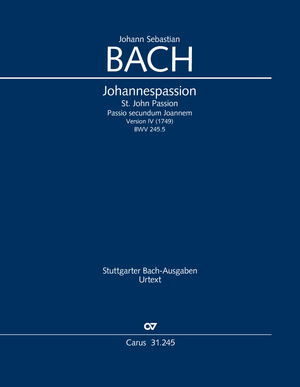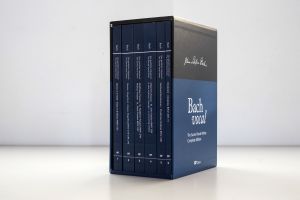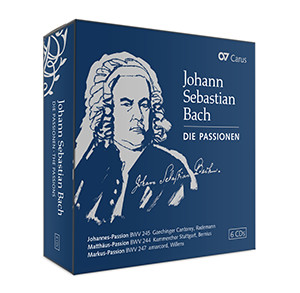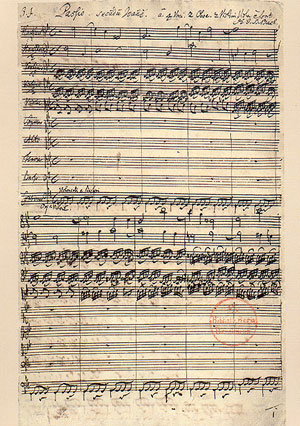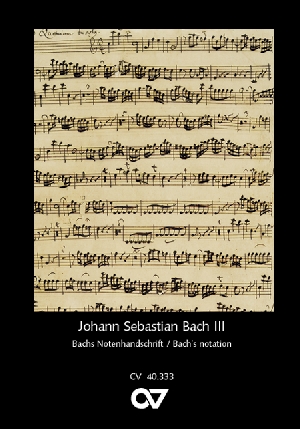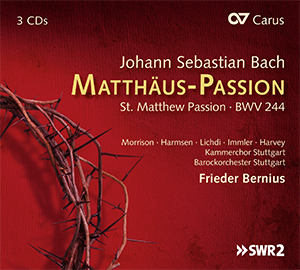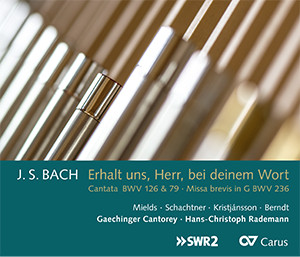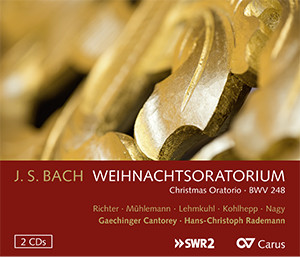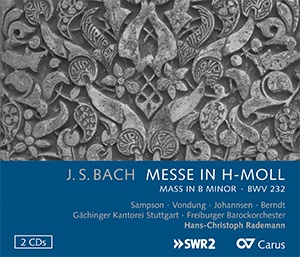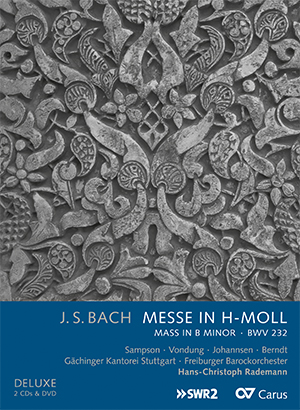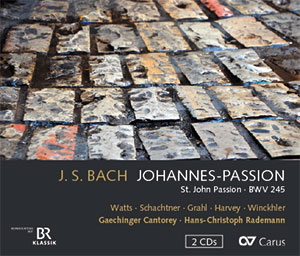
The St John Passion occupies a special place in Johann Sebastian Bach’s output. Hardly any other work survives in so many and, at the same time, such different versions. This is because Bach made changes to the work for each of his Leipzig performances. For this CD recording, Hans-Christoph Rademann has chosen the fourth version of the Passion. Composed shortly before Bach’s death, it represents a return to the first version, augmented by larger instrumental forces. It is very close to the version of the Passion which has been mostly frequently performed since the first edition of 1830 – a mixture of the 1739 and 1749 versions – but by comparison, this constitutes an authentic version by Bach.
The performers are the choir and ensemble of the Gaechinger Cantorey, under the artistic direction of Hans-Christoph Rademann. The soloists are Elizabeth Watts, soprano, Benno Schachtner, alto, Matthias Winckhler, bass, Patrick Grahl, tenor (Evangelist & arias), and Peter Harvey, bass (Christus).
Recorded in collaboration and with the friendly support of Bachwoche Ansbach.
Contents
-
Composer
Johann Sebastian Bach
| 1685-1750Johann Sebastian Bach is one of the most important composers of Western music history. He came from a widely ramified musical dynasty, which produced numerous musicians and organists in the Thuringian-Saxon area.
Bach vocal
Ever since Carus-Verlag was founded in 1972, publishing the music of Johann Sebastian Bach has been a special focus for us. In the 2017 Reformation anniversary year we completed the Bach vocal project. Bach's complete sacred vocal works are now available in modern Urtext editions, together with performance material. A complete edition of all the full scores is also available in a high quality box set. Personal details
-
Vocal score arranger
Paul Horn
| 1922-2016Paul Horn war ein deutscher Kirchenmusiker, Organist, Komponist und Musikwissenschaftler. Er studierte Kirchenmusik und Orgel an der Evangelischen Kirchenmusikschule Esslingen am Neckar bei Hans-Arnold Metzger und Musikwissenschaft, Theologie und Geschichte an der Universität Tübingen. Seine berufliche Laufbahn begann als Kantor an der Evangelischen Michaelskirche in Stuttgart-Degerloch. 1954 wurde er Kantor an der Evangelischen Stadtkirche Ravensburg, eine Position, die er bis zu seiner Pensionierung innehatte. Als Musikwissenschaftler arbeitete Horn bis ins hohe Alter eng mit Carus zusammen. So stammen zahlreiche Carus-Klavierauszüge aus seiner Feder. Personal details
-
Preface writer
Michael Maul
-
Translator
Henry Drinker
-
Ensemble
Gaechinger Cantorey
The Gaechinger Cantorey is the ensemble of the International Bach Academy Stuttgart. It combines a Baroque orchestra and a hand-picked choir to form a finely tuned early music ensemble. Under the baton of academy director Hans-Christoph Rademann, this ensemble is dedicated to the international dissemination of a “Stuttgart Bach style.” Since its re-establishment as the Gaechinger Cantorey in 2016, the ensemble of the International Bach Academy has gained renown with numerous performances in Germany, such as at the Musikfest Stuttgart, the Bachwoche Ansbach, the Bachfest Leipzig, the Rheingau Music Festival, the Festspielhaus Baden-Baden, the Dresden Kulturpalast, and the Hamburg Elbphilharmonie, as well as abroad at the Théâtre des Champs-Élysées in Paris, in the USA (Fort Lauderdale, Chapel Hill, Norfolk, Princeton, Los Angeles, Irvine, Williamsburg), in Canada (Montréal), and in South America (São Paulo, Rio de Janeiro, Buenos Aires, Lima, Santiago de Chile, Bogotá). In addition, the Gaechinger Cantorey with its director Hans-Christoph Rademann pursues a busy recording schedule. On the Stuttgart label Carus and on accentus music, the ensemble has recorded the Christmas Oratorio, cantatas and the two Passions by J.S. Bach, Handel’s Messiah, Haydn’s Creation and other works. Digital podcasts and concert streams with the Gaechinger Cantorey are also available in the Bach Academy’s media library. From May 2023 to June 2024, the Gaechinger Cantorey, under the direction of Hans-Christoph Rademann, will perform all J.S. Bach’s cantatas from his first year as Kantor at St. Thomas’s Church in Leipzig – exactly 300 years after the historic event in 1723/1724. CD recordings of all the concerts in churches and concert halls in Stuttgart and the surrounding area will be released by Hänssler Classic. The Gaechinger Cantorey regularly and enthusiastically participates in the various music education formats of the International Bach Academy under the motto “BachBewegt!,” in which children and young people are actively invited to sing, dance and experience music on stage or as listeners in the concert hall. These include family concerts, joint performances and danced interpretations of important masterpieces of the oratorio literature. Personal details
-
Conductor
Hans-Christoph Rademann
| 1965Conductor Hans-Christoph Rademann is an immensely versatile artist with a broad repertoire who devotes himself with equal passion and expertise both to the performance and rediscovery of early music and to the first performances and cultivation of Contemporary Music. Born in Dresden and raised in the Erzgebirge mountains, he was influenced at an early age by the great Central German kantorial and musical tradition. He was a student at the traditional Kreuzgymnasium, a member of the famous Kreuzchor, and studied choral and orchestral conducting at the Carl Maria von Weber University of Music in Dresden. During his studies, he founded the Dresdner Kammerchor and formed it into a top international choir which is still under his direction today. Since 2013, Hans-Christoph Rademann has been the academy director of the International Bach Academy Stuttgart. He regularly collaborates with leading choirs and ensembles of the international music scene. From 1999 to 2004 he was chief conductor of the NDR Choir and from 2007 to 2015 chief conductor of the RIAS Chamber Choir. Guest conducting engagements have led and continue to lead him to the Nederlandse Bachvereniging, the Collegium Vocale Gent, the Akademie für Alte Musik, the Freiburger Barockorchester, the Deutsche Radiophilharmonie Saarbrücken Kaiserslautern, the Sinfonieorchester Basel, the Orchestre Philharmonique de Luxembourg, among others. Hans-Christoph Rademann has been awarded prizes and honors for his artistic work, including the Johann Walter Plaque of the Saxon Music Council (2014), the Saxon Constitutional Medal (2008), the Sponsorship Prize as well as the Art Prize of the state capital Dresden (1994 and 2014 respectively). He received the Preis der Deutschen Schallplattenkritik several times for his numerous CD recordings (most recently in 2016), as well as the Grand Prix du Disque (2002), the Diapason d’Or (2006 & 2011), the CHOC de l’année 2011 and the Best Baroque Vocal Award 2014. In 2016 he was awarded the European Church Music Prize of the city of Schwäbisch Gmünd. His exemplary interpretation and recording of the complete works of Heinrich Schütz with the Dresdner Kammerchor in the Stuttgart Carus-Verlag, which was completed in 2019, was awarded the newly endowed Heinrich Schütz Prize as well as the OPUS KLASSIK 2020 in the same year. Hans-Christoph Rademann is professor of choral conducting at the Carl Maria von Weber University of Music in Dresden. He is also artistic director of the Musikfest Erzgebirge, ambassador of the Erzgebirge and patron of the Christian Hospice Service Dresden. Personal details
-
Soloist - soprano
Elizabeth Watts
-
Soloist - soprano
Mirjam Striegel
-
Soloist - alto
Benno Schachtner
-
Soloist - tenor
Patrick Grahl
-
Soloist - tenor
Christoph Pfaller
-
Soloist - tenor
Wolfgang Frisch-Catalano
-
Soloist - baritone
Peter Harvey
Peter Harvey’s hundred or so recordings span eight centuries of music, with the High Baroque particularly well represented. He has performed and recorded all of J. S. Bach’s major vocal works and many of the cantatas. From the French Baroque, he has made many recordings of Campra, Lully, Lalande and others, including a recent solo disc with London Baroque of Rameau’s secular cantatas for bass voice. The Gabrieli Consort’s recording of Haydn’s Creation, on which Peter sings Adam, won the 2008 Gramophone Award. Peter directs the Magdalena Consort, specializing in the performance of the music of Bach with small ensembles. He is increasingly returning to the Lied repertoire, and has recently recorded Schubert’s Die Winterreise with pianist Gary Cooper. Personal details
-
Soloist - bass
Matthias Winckhler
-
Soloist - bass
Florian Schmitt-Bohn
Reviews
... Rademann und seiner personell, orthographisch und stilistisch gegenüber Vorgänger Helmuth Rilling revolutionär veränderten Gaechinger Cantorey gelingt vokal und instrumental eine beeindruckende, schlüssige und dramatisch mitreißende Aufführung. Reinhard Mawik, Zeitzeichen, 4/2020
... eine außergewöhnliche Aufnahme! ... Da klingt alles prägnant, rhythmisch pointiert, aber nie grell, sondern trotz ergreifender Eindringlichkeit stets in mildes Licht filigraner Streicherpassagen, aparter Farbmischungen der Bläser oder zarter Gambentöne getaucht. [Die Solisten] finden die ideale Balance zwischen klarer Deklamation und kantablem Melos.
Schwäbische Zeitung, 07.04.2020
... Famose Solisten ... Die Gaechinger Cantorey und Hans-Christoph Rademann haben ihrer wachsenden Diskografie eine in Niveau und Ambition absolut harmonische Johannes-Passion hinzugefügt.
Dr. Matthias Lange, klassik.com, 10.04.2020
... Das vom Ideal der historischen Aufführungspraxis geleitete Ensemble unter der Leitung von Hans-Christoph Rademann besticht vom Eingangs- bis zum Schlusschoral durch perfekt aufeinander abgestimmtes Musizieren und einen sehr ausgewogenen, homogenen Klang.
Sonja Jüschke, Chorzeit, 04/2020
... Die Aufnahme (Bayerischer Rundfunk) bietet ein reiches, detailliertes Klangbild mit Tiefe und transportiert darin die musikalische Wirkung sehr genau. Hans-Christoph Rademanns Einspielung von Bachs Johannes- Passion verdient daher – mit minimalen Abstrichen – eine dringende Empfehlung.
Hartmut Schütz, Dresdner Neueste Nachrichten, 24.03.2020
... Die Melismen, beispielsweise im Eingangschoral, sind blitzsauber und rhythmisch präzise gesungen. Der Chor klingt in der Tiefe voll und in der Höhe nie grell, sondern stets weich und meistert auch schwierige Passagen wie etwa die Chromatik auf «wäre dieser nicht ein Übeltäter» mit Bravour.
Chorzeit, April 2020
... Rademann bietet auf jeden Fall ein stimmiges musikalisches Konzept mit einem ausgewogenen Solistenensemble.
Bettina Winkler, Kulturradio SWR2, 05.03.2020
... Rademann füllt diese Produktion mit Fantasie und dramaturgischem Feinsinn, was sich auch auf die Gestaltung der Rezitative erstreckt. ... Die Aufnahme strahlt Ruhe, Größe, Souveränität und Detailfreude aus.
Christian Lahneck, concerti, 03.02.2020
... Herausgekommen ist auf jeden Fall eine spannende CD mit hervorragenden Solisten, die auch für Kenner der Passion einige Überraschungsmomente enthält.
APA - Austria Presse Agentur eG, 02/2020
... Das Hörerlebnis berührt tief und kann allen Leserinnen der Zeitschrift als Begleitung der Fasten- und Passionszeit aufs Wärmste empfohlen werden.
Monika Fahrnberger, singende kirche, 1/2020
... Hans-Christoph Rademann ist es mit seiner Gaechinger Cantorey hier gelungen, eine maßstabsetzende Aufnahme von Bachs Johannes-Passion zu gestalten. ... Klangschönheit und äußerste Exaktheit scheinen selbstverständlich zu sein; faszinierend ist die Lebendigkeit des Gestaltens, die auf einem Tonträger nur schwer zu finden ist.
Gustav Danzinger, CHOR aktuell, 1/2020
... Oratorienmusik vom Feinsten, aufgeführt von Mitgliedern der Gaechinger Cantorey, zusammen mit internationalen jugendfrischen Solisten von nah und fern, nach allen derzeitigen Regeln der historisch orientierten Aufführungspraxis.
Württembergische Blätter für Kirchenmusik, 04/2021
Frequent questions about this work
 There are no questions and answers available so far or you were unable to find an answer to your specific question about this work? Then click here and send your specific questions to our Customer Services!
There are no questions and answers available so far or you were unable to find an answer to your specific question about this work? Then click here and send your specific questions to our Customer Services!


